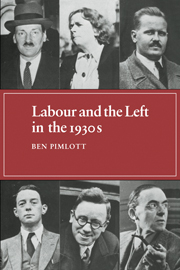Summary
The activities of Sir Stafford Cripps made good copy. Reporters flocked to the meetings of ‘the red squire’ who took delight in embarrassing his staider colleagues, and who could usually be relied upon for remarks of outrageous subversiveness. Cripps' Socialist League was not, however, the only Labour Party pressure group battling against Transport House. Out of the limelight, local activists were involved in another, far more representative, skilful and successful assault on entrenched Executive attitudes. Unlike the Socialist League, the unofficial ‘Constituency Parties Movement’ was a genuine outgrowth of local feeling. Unlike the League, it obtained massive support within the Party. Instead of tackling the leadership on the whole range of policy, it concentrated on a few, attainable, demands. Greatest contrast of all, it achieved its main objective –a fundamental change in the Party Constitution and in the balance of membership on the National Executive.
The real influence of the NEC has varied – depending on the strength of the Parliamentary Party, on the relationship between the trade unions and the Party leadership, and on whether Labour has been in or out of office. Yet, in spite of fluctuations, the National Executive has always been the most powerful body in the Labour Party outside Parliament. Constitutionally the sovereign body in the Party is Annual Conference. But between Conferences it is the National Executive which is in charge of all aspects of Party organisation, discipline and policy; it is the Executive which submits policy resolutions, and detailed policy declarations, to Conference for approval; and it is the Executive, in conjunction with the Cabinet (when Labour is in power) or the Shadow Cabinet (when it is not) which determines the content of Labour's election manifesto.
- Type
- Chapter
- Information
- Labour and the Left in the 1930s , pp. 111 - 115Publisher: Cambridge University PressPrint publication year: 1977
- 1
- Cited by



